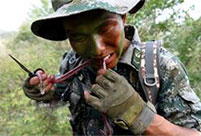

China will encourage the public, businesses and non-governmental organizations to help prevent soil depletion, or desertification, and reclaim land that has been damaged.
Desertification typically results from climate change or human activities such as overgrazing or poor agricultural practices.
The goal is to reclaim 1 million hectares by 2020 and to slow the process of desertification across the country.
China is facing severe soil depletion. Over the past 50 years, 1.73 million square kilometers of soil has been lost to desertification, accounting for 18 percent of the country's total land area and directly affecting one-third of all residents - about 400 million people - Vice-Premier Wang Yang said on Tuesday.
The central government has paid close attention to the problem and has mounted comprehensive efforts to fight soil loss and poverty together, a unique approach globally, and it has already made significant progress, Wang said.
In the past five years, governments at various levels have treated more than 10 million hectares of desertified land through replanting efforts, and slowed land loss, Wang said.
Wang was speaking at the Fifth Kubuqi International Desert Forum in Ordos, the Inner Mongolia autonomous region.
The central government, which has set specific targets on its road map toward eco-civilization, said in April that sandy land will be further reduced by 10 million hectares by 2020.
The central government will encourage the participation of enterprises and individuals, compensating them for efforts to reduce soil loss and reclaim land, Wang said.
China will conduct more scientific research, issue policies to improve governmental management and pursue more international cooperation. One success is the Kubuqi Desert in Ordos, he said.
The desert, the seventh-largest in China, is one of three major sources of sand that afflicts Beijing, 800 kilometers away. Sand from the desert can arrive in Beijing in a day with wind speeds of around 36 kilometers per hour, according to forum documents.
Elion Resources Group spent the past 27 years combating desertification in the Kubuqi Desert, greening over 6,000 square kilometers, according to Wang Wenbiao, Elion's founder and chairman, who attended the forum.
The company has developed a comprehensive system to control desertification by planting various plants in the desert to improve the land quality. It has sold some of those plants at a profit.
"The participation and strong support from enterprises is quite important," said Liu Bailing, a researcher in ecology from a branch institute of the Chinese Academy of Sciences.
 Student proposes during graduation ceremony
Student proposes during graduation ceremony China-made special vehicles in exhibition
China-made special vehicles in exhibition Soldiers serving at Liaoning aircraft carrier
Soldiers serving at Liaoning aircraft carrier Bikini beauties lifeguards in river rafting place
Bikini beauties lifeguards in river rafting place PLA soldiers eat raw snake meat in harsh training
PLA soldiers eat raw snake meat in harsh training Kiss contest held in Nanning, SW China
Kiss contest held in Nanning, SW China Yunnan-Myanmar Road: The past and present
Yunnan-Myanmar Road: The past and present Photos of beautiful policewoman become online hit
Photos of beautiful policewoman become online hit Campus belle of Xiamen University gets popular online
Campus belle of Xiamen University gets popular online Belt of possibility
Belt of possibility ‘Abnormal’ stock dip to be probed: CSRC
‘Abnormal’ stock dip to be probed: CSRC TPP’s geopolitical leverage may be inflated
TPP’s geopolitical leverage may be inflated ‘Tiger mothers’ turn out to have deep pockets that fuel kids’ success
‘Tiger mothers’ turn out to have deep pockets that fuel kids’ successDay|Week